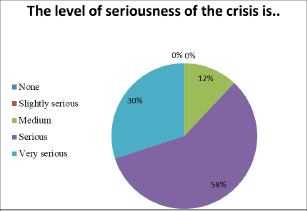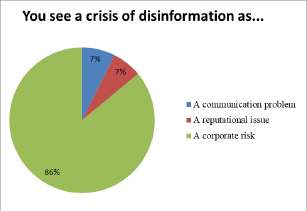doxa.comunicación | nº 31, pp. 19-39 | 27
July-December of 2020
Magdalena Mut Camacho
ISSN: 1696-019X / e-ISSN: 2386-3978
This question is the most indicative of the extent to which those responsible for reputation in Spanish companies are aware of the problem of falsehoods and disinformation, and the level of damage to brands due to their virality. It is important to point out that no one shows any degree of doubt, as all of the interviewees had a clear, categorical opinion because no one selected the option of “Don’t know/ Don’t answer” (Chart 1).
Chart 2. Definition and severity of the problem

Source: Prepared by the author
It is important to note that the appearance of a falsehood is considered to be an attack at the heart of the organization, a corporate risk that should be viewed as worrisome and perilous for the business. The answer to this question is important for reaching conclusions, as the vast majority choose to define a crisis as a corporate risk (Chart 2), which implies a larger task and a more preeminent role. In the opinion of the respondents, it constitutes a serious threat to an organisation. When asked about the level of seriousness of this type of crisis, the answers were divided among very serious (30%), serious (58%), and average seriousness (12%).
If added together, the percentages of very serious and serious comprise 88% of the answers given by the respondents. It is interesting to note that no one responded with none or slightly serious.
